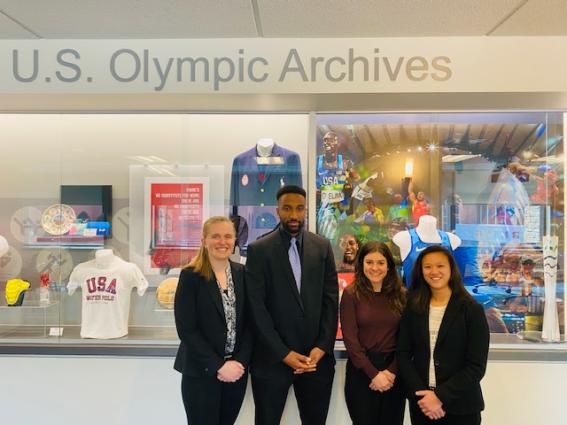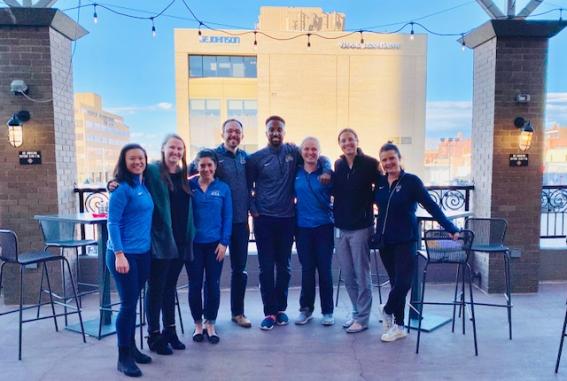McCormack Master’s Students Consult with OOFOS and the U.S. Olympic & Paralympic Committee
April 23, 2020

“Our capstone has lived up to its name,” observes second-year MBA/MS student Lauren Yung. “It has given us an opportunity to draw from different disciplines—economics, marketing, HR, data analysis—you name it.” Yung gives high points to Isenberg’s Mark H. McCormack Department of Sport Management for the department’s annual industry consulting practicum for final-semester master’s degree students.
This year, two teams—each with four students—have spent much of the semester tackling assignments on behalf of two industry clients. The first, the U.S. Olympic & Paralympic Committee (USOPC), coordinates strategic, operational, and other activities for the nation’s Olympic and Paralympic initiatives. The second, OOFOS, is an eight-year old recovery-footwear company based in Braintree that was cofounded by UMass sport management alumnus Lou Panaccione.
“For OOFOS, our team is focusing on marketing research,” notes Meaghan McClure, who is also a second-year MBA/MS student. “That includes expanding brand awareness for the product and finding new markets beyond running.” She says that neither she nor the other members of her group had heard of OOFOS before, so they were in a good position to think about strategies for reaching a wider audience with a product that relieves foot stress after running and other athletic activities. “One is for OOFOS to align with consumer touchpoints that attract mass participation,” she says. The experience of working with a smaller local brand has been rewarding: “It’s interesting to see how they operate—both to compete with other footwear brands but also to make consumers more aware of the recovery footwear category in general,” says McClure.
The group meets once a week online with the client, as well as meeting separately as a group and with its advisor and mentor, Isenberg Sport Management Lecturer Will Norton (pictured below, fourth from left, with Lauren Yung, Meaghan Burke '19 MBA/MS, Christina Mancini, Christien Wright, Jessica Hamby, Rachel Lee '17 MBA/MS, and USOPC practicum client Danielle Lopez '12 MS).
For the USOPC project, the Isenberg team is helping the organization to diversify its commercial approach. “I was actually somewhat familiar with the USOPC as a fan of the Olympics as well as through classes,” says Yung. “But working on this project takes that understanding and appreciation to a whole different level.”

The team began by mining and assessing best practices and commercial strategies from 12 industry sectors. From there, it created a top-ten list of proposals. Before the current pandemic hit, the team traveled to USOPC headquarters in Colorado Springs, where in presentations to an executive team from the organization, it downsized the proposals to five. This month, the team has been refining the proposals through both qualitative and quantitative scrutiny. “The project has called for creativity, teamwork, market research, risk assessment, and communication skills,” emphasizes Yung. “It is one thing to hear how business is done, but it is another thing to be a part of it,” she adds.
Connecting With Faculty and Alumni Network
“We source our clients from faculty connections, as well as the McCormack Department’s robust industry alumni database of over 3,000 professionals working in the commercial sports industry,” observes Norton. “The capstone,” he adds, “is a great way for alumni to engage with our program and our students. In recent years, we’ve worked hand-in-hand with The Madison Square Garden Company, VISA, the New York Red Bulls, Under Armour, the Naismith Basketball Hall of Fame, and other high-profile clients.” For the OOFOS project, students, notes Norton, are interacting with Director of Marketing Darren Brown, President Steve Gallo, and Co-Founder and UMass alumnus, Lou Panaccione. For the USOPC initiative, the lead contact is Senior Business Operations Consultant Danielle Lopez, a 2012 McCormack graduate.
Students are assigned to the teams based on “instructor feedback and what we know about student strengths and career aspirations,” says Norton. “Our goal is to form two cohesive, well-balanced groups.” Yung adds that “the practicum allows us to apply what we’ve learned in the classroom. Just as important though, it’s a terrific transition into our careers.”